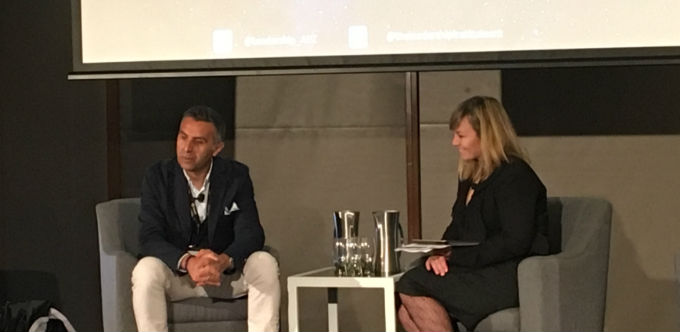
Nestle's global innovation director Gerardo Mazzeo speaking at the Disruptive Innovation Summit 2018.
Global food and drinks giant Nestle is offering startups $US50,000 ($67,260) in funding to develop solutions to social, environmental and health issues, and to boost innovation.
Through the company’s HENRi@Nestle program, businesses within Nestle outline challenges or briefs, detailing problems they would like to address and inviting startups to submit innovative solutions. The program is open to startups around the world, but the submissions must be in English.
Startups must be at least at a proof-of-concept stage, and successful applicants will receive the funding, as well as mentoring from a senior sponsor at Nestle, who can add additional cash if needs be.
Speaking at the Disruptive Innovation Summit 2018 in Sydney on Thursday, Gerardo Mazzeo, global innovation director at Nestle, acknowledged that “speed and agility are not exactly adjectives that would come to mind if you were describing Nestle”.
Historically, the company has been slow to meet customer needs, being overtaken by smaller and more agile competitors, and it’s now using “experimentation and collaborative innovation to try to bring the outside world in”, said Mazzeo.
According to Mazzeo, Nestle will “benefit from … [startups’] creativity and their ingenuity for problems that we don’t have the solutions to at the moment”, while also speeding up the process of getting innovative solutions in place at the global food and drinks company.
The idea is to combine Nestle’s resources with the agility of startups, Mazzeo said.
“When you marry the internal world, where we can give [startups] access to geographic scale, science and technology, R&D, and they bring that creativity, that speed and that agility, you really can bring some amazing impact to those challenges that we have within our organisation.”
Accordingly, the time between a challenge being posted and a startup team beginning work on a solution can be as little as 90 days, Mazzeo said. In contrast, innovative solutions at Nestle have previously taken an average of more than three years to come into effect.
Since the program was launched in 2016, 12 startups have been recruited, working on projects ranging from the development of a new material to replace PET plastic drinks bottles; to connecting Nespresso coffee customers with the farmer suppliers through live video links; and a health project working on faster and easier diagnosis of micronutrient deficiencies in rural areas in the Philippines.
For the startups involved, it might not be a conventional way to source seed funding or to get their product to market. But, according to Mazzeo, they’re attracted by “the geographic scale and the depth of distribution we can offer them”, as well as the opportunity to scale their solution at speed and get “all the right people in the same room at the same time”.
StartupSmart attended the Disruptive Innovation Summit 2018 as a guest of the event.
NOW READ: Why you should worry if your boss says: ‘We’re going agile!’
| Passionate about the state of Australian startups? Join the Smarts Collective and be a part of the conversation. |


COMMENTS
SmartCompany is committed to hosting lively discussions. Help us keep the conversation useful, interesting and welcoming. We aim to publish comments quickly in the interest of promoting robust conversation, but we’re a small team and we deploy filters to protect against legal risk. Occasionally your comment may be held up while it is being reviewed, but we’re working as fast as we can to keep the conversation rolling.
The SmartCompany comment section is members-only content. Please subscribe to leave a comment.
The SmartCompany comment section is members-only content. Please login to leave a comment.